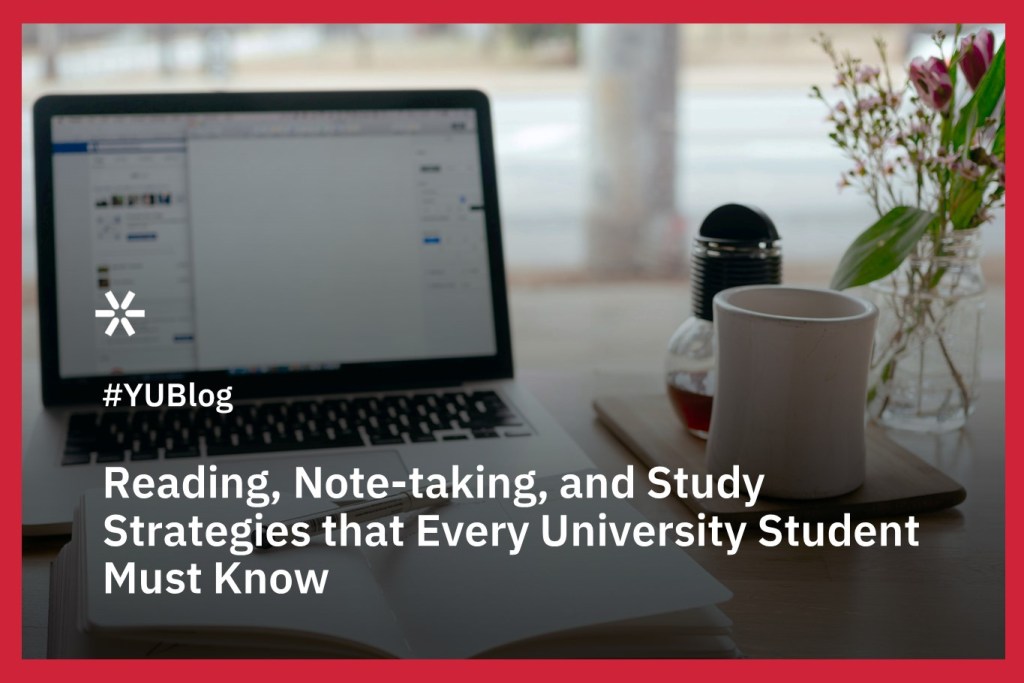
The process of studying at university is very different from that at high school. While most of us realize this fact after a term or two, we are here today to let you in on some study secrets so that you don’t have to struggle. This #YUBlog takes you through study techniques that can help you succeed at York!
Reading and Note-taking
It all begins here!
If you have not engaged with the readings or taken effective notes, studying before exams can be frustrating. Therefore, it only makes sense to start early in the term and keep yourself organized!
Academic reading requires much more than “just reading”. In fact, academic reading is learning and requires a complex skillset. The PQ3R method is a super effective strategy to improve your reading skills.
P – Preview: Scan the material and take note of key concepts.
Q – Question: From what you’ve read so far, generate questions to answer.
R – Read: Read actively and critically.
R – Recite: Rephrase the material in your own words.
R – Review: Consistently review your material so that you don’t forget what you’ve learned!
Watch the Active Reading video to learn from Learning Skills Specialist on how to become an active learner.
Note-taking is another crucial step to effective studying. To improve your note-taking skills:
- Listen actively during lectures and tutorials.
- Keep your notes simple. I know that colour coding can be fun and make your notes pretty, but unless that truly serves a purpose, it is better to avoid using your time to decorate your notes.
- Watch for clues! While sometimes instructors are outright about important points for exams and assignments, keep an eye out for clues that may not be obvious. Verbal and non-verbal cues such as body language, voice tone and pace, repetition of ideas, and the time spent on subjects can indicate important ideas to write down.
- Be selective. Don’t copy everything that’s there in your instructor’s slides. Especially if they share the slides afterwards, focus on what the instructor is saying.
- Organize your notes according to topics and sub-categories while leaving some extra space to return to your notes to add more information and use them to test yourself later.
- Choose the right method. Some of us are better with written notes, others with digital ones. Choose the note-taking method that suits you best.
Deea’s Pro tip: These strategies are great, but they won’t work unless you review your notes and readings regularly to draw connections between course themes and big ideas. Doing this regular review can assist you in seeing the big picture.
Alicia’s Pro tip: Make sure you have a safe and secure way of storing your notes. Be sure to back up digital documents on an external hard drive or on the cloud (Google Drive is a great solution) and take extra precautions for printed ones. It would also be a good idea to scan and save your printed notes digitally so that in case something happens, you have a backup!
Here are some templates that can help you get started:
- Connecting A Reading to Course Objectives (doc)
- Identifying Topic, Evidence And Arguments In A Reading (doc)
- PQ3R (pdf)
- Note-taking Template for Course Readings (doc)
- Note-taking Brochure (pdf)
Now that we’ve got our reading and note-taking skills down, let’s explore some study techniques that can help you learn effectively.
Study Techniques

We’ve found the following six effective strategies, recommended by The Learning Scientists, that are most effective:
- Active recall: Quiz yourself on course material without looking at your notes. Then check for accuracy and if you missed anything. You can create flashcards (paper or digital) that can help you with this strategy. If digital is your jam, free apps like Anki and Quizlet are popular online options.
- Spaced repetition: Start planning early for exams and set up a study schedule for each of your courses. Make sure to periodically go back to older reading material and notes to freshen up on those concepts along with recent stuff. This helps you to remember all your course content.
- Interleaving: Don’t study the same idea for too long. Not only is that boring, but it also switches off your cognition. Shift between concepts during a study session to keep your brain on its toes!
- Elaboration: While studying, ask yourself questions about how the concepts work and why, and then find the answers in your course material. Elaborate the answers, make connections and explain how they all work together. This is especially helpful for essay-style answers, where you are expected to show what you’ve learned in an expanded form.
- Concrete examples: Don’t just reach for the examples that your instructors shared in class. Try to find other examples or even come up with your own! If you are unsure of your own examples, you can always run them by your instructors during their office hours (or by raising your hand in class!) to make sure that you are on the right track.
- Dual coding: Use both text and visuals to learn. Often, you will find visuals like images, graphs, videos, infographics on the topics that you are studying. Incorporating these visuals into your notes can make concepts simpler and easier to understand and remember. You can also create your own representations of the information in ways that suit you best.
Deea’s pro tip: Sometimes, combining two or more strategies can be a good idea. Remember that one strategy may not work for all your courses. For example, elaboration may not work for a math course. Spaced repetition will. Dual coding is not always necessary for an English or writing course; it would be more beneficial to use a combination of active recall, elaboration, and concrete examples.
Alicia’s pro tip: As you integrate different studying techniques, be sure to plan out your study times and account for breaks. Refer to this other #YUBlog on Time Management Tips for York U Students for more details.
These study techniques should be a good starting point on your journey to finding out what works best for you.
If you’d like more in-depth content on these strategies, attend the Learning Skills Services (LSS) workshops on these topics and much more! Check out the LSS events calendar to register for the ones that you need.
Let us know in the comments below if you use any of these study techniques or if you have one of your own!
